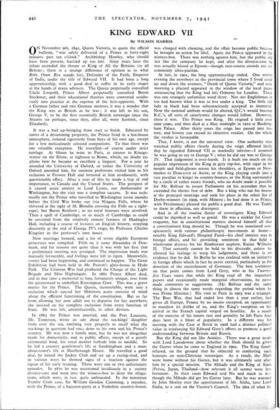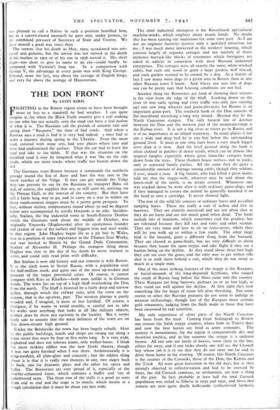KING EDWARD VII
By WILSON HARRIS
ON November 9th, 1841, Queen Victoria, to quote the official bulletin, " was safely delivered of a Prince at forty-eight minutes past ten o'clock." Archbishop Howley, who should have been present, hurried up too late. Sixty years later the infant ascended the throne as King of All the Britains (or all Britons ; there is a strange difference of opinion as to what Brut. Omn. Rex stands, for), Defender of the Faith, Emperor of India, under the title of Edward VII. It had been a long apprenticeship, with a good deal to suffer in its early stages at the hands of many advisers. The Queen perpetually consulted Uncle Leopold, Prince Albert perpetually consulted Baron Stockmar, and their educational theories were converted assidu-
- ously into practice at the expense of the heir-apparent. With a German father and two German mentors it was a wonder that the King was as British as he was ; it was left to his son, George V, to be the first essentially British sovereign since the Stuarts (or perhaps, since they, after all, were Scottish, since Elizabeth).
It was a bad up-bringing from start to finish. Educated by tutors of a devastating propriety, the Prince lived in a hot-house atmosphere, isolated rigorously from boys of his own age, except for a few meticulously selected companions. To that there was one valuable exception. He travelled—of course under strict tutelage. At fifteen he went to Paris, at sixteen to Kfinigs- winter on the Rhine, at eighteen to Rome, which, no doubt ex- plains how he became so excellent a linguist. For a year he attended the University of Oxford, or rather the University of Oxford attended him, for eminent professors visited him in his seclusion at Frewen Hall and lectured at him assiduously, with questionable effect. After a year of this he made a trip of real importance, to Canada and the United States. The prospect of it caused acute anxiety to Lord Lyons, our Ambassador at Washington, but the visit was a complete success. It was tech- mcally not the Prince who travelled to Washington seven months before the Civil War broke out (via Niagara Falls, where he shivered at the sight of M. Blondin crossing the Falls on a tight- rope), but Baron Renfrew ; so no royal honours were involved. Then a spell of Cambridge, or so much of Cambridge as could be savoured from the relatively remote' fastness of Madingley Hall, including a course of lectures on English history, stopping discreetly at the end of George IV's reign, by Professor Charles Kingsley in the professor's own house.
Now marriage loomed, and a list of seven eligible European princesses was compiled. Fifth on it came Alexandra of Den- mark, and for reasons not quite clear it was with her first that a preliminary meeting was arranged. The impression made was mutually favourable, and feelings were left to ripen. Meanwhile, events had been happening, and continued to happen. The Great Exhibition had been held in Mr. Paxton's glass-house in Hyde Park. The Crimean War had produced the Charge of the Light Brigade and Miss Nightingale. In 0361 Prince Albert died, and in due time a memorial to him, fortunately unique, rose from the greensward to embellish Kensington Gore. This was a grave matter for the Prince. The Queen, inconsolable, went into a seclusion which caused her Ministers acute exercise of mind about the efficient functioning of the constitution. But so far from allowing her now adult son to deputise for her anywhere, she insisted on his complete exclusion from every function of State. He was left, unsatisfactorily, to other devices.
In 1863 the Prince was married, and the Poet Laureate, Mr. Tennyson, wrote an ode about the sea-kings' daughter from over the sea, omitting very -properly to recall what the sea-kings in question had once done to his own and his Prince's country. He was now a family man, but he was not altogether made for domesticity, and in public affairs, except of a purely ceremonial kind, his royal mother forbade him to meddle. So he led a country gentleman's life at Sandringham and a man- about-town's life at Marlborough House. He travelled a good deal, he joined the Jockey Club and set up a racing-stud, and in various ways he showed signs of a reaction against the rigour of his early training. There were one or two unfortunate episodes. In 1870 he was mentioned invidiously in a society divorce-case and went into the witness-box to deny the allega- tions, which were, in fact, quite unfounded. In the notorious Tranby Croft case, Sir William Gordon Cumming, a member, with the Prince, of a baccarat-party at a Yorkshire country-house, was charged with cheating, and the zffair become public because he brought an action for libel. Again the Prince appeared in the witness-box. There was nothing against him, but the public did not like the company he kept, and after the divorce-case he was actually hissed at Epsom—though race-course crowds are not commonly ultra-puritan.
At last, in 1901, the long apprenticeship ended. One winter evening the newsboys in the provincial town where I lived cried up and down the avenues, " Death of Queen Victoria," and next morning a placard appeared in the window of the local paper announcing that the King had left Osborne for London. There was one strangely unfamiliar word there. Not one Englishman in ten had known what it was to live under a king. The little old lady in black had been subconsciously accepted as immortal. Now the national anthem would be altered, Q.C.'s would become K.C.'s, all sorts of cataclysmic changes would follow. However, there it was. The Prince was King. He reigned a little over nine years, and then died at a May midnight in 1910 at Bucking- ham Palace. After thirty years the reign has passed into his- tory, and history can record its objective verdict. On the whole the verdict is favourable.
That, I know, is not the universal view. One authority who watched public affairs closely during the reign affirmed lately that he regarded Edward VII as markedly inferior—I assumed he was going to say to George V ; what he did say was to George IV. That judgement is over-harsh. It is built too much on the popular impression of the King in grey top-hat, with cigar in his mouth and field-glasses across his shoulders, at Epsom or New- market or Doncaster or Ascot; or the King playing cards (not a vice peculiar to kings) in country-houses; or the King surrounded by a circle of rather exotic friends, who no doubt made it possible for Mr. Balfour to assure Parliament on his accession that he ascended the throne free of debt. But a king who ran his horses at the principal meetings and took his place in the select list of Derby-winners (in 1909, with Minoru ; he had done it as Prince, with Persimmon) pleased the public a good deal. He was Teddy to them in affection, not disrespect.
And in all the routine duties of sovereignty King Edward could be dignified as well as genial. He was a stickler for Court etiquette, but in constitutional matters showed himself all that a constitutional king should be. Though he was associated con- spicuously with various philanthropic movements at home— notably King Edward's Hospital Fund—his chief interest was in foreign affairs, and his prevailing sentiment in that field a wholesome distaste for his flamboyant nephew, Kaiser Wilhelm II. That certainly cannot be held to his discredit, unless he allowed his feelings to warp his judgement, and there is no evidence that he did. In Berlin he was credited with an initiative in foreign affairs which in fact he never exerted, particularly in the direction of the encirclement of Germany. The best testimony on that point comes from Lord Grey, who in his Twenty- five Years states that while the King read all the important papers and occasionally made marginal observations, he „never made comments or suggestions. (Mr. Balfour said the same thing in almost the same words regarding the period when he was Prime Minister.) His visit to. Paris in 1903 was a triumph. The Boer War, that had ended less than a year earlier, had given all Europe, France by no means excepted, an opportunity to manifest its dislike of us, and the King's reception -on his arrival in- the French capital verged on hostility. As a result of the exercise of his innate tact and geniality he left Paris foul days later in a blaze of popularity. In a different way his meeting with the Czar at Reval in 1908 had a distinct political value in reinforcing Sir Edward Grey's efforts to promote a good understanding between Britain and Russia.
But the King did not like Asiatics. There was a great to-do with Lord Lansdowne about whether the Shah should be given the Garter when he came to England in 19o2. The King firmly refused, on the ground that he objected to conferring such honours on non-Chtistian sovereigns. As a result, the Shah went home without his Garter, but it was ultimately sent after him by a special mission. The Mikado and the King of Siam (Persia, Japan, Thailand—how relevant it all seems) were less fortunate. In their cases Edward said No and stuck to it— though the‘Mikado did get his Garter later. But he was worsted by John Morley over the appointment of Mr. Sinha, later. Lord Sinha, to a seat on the Viceroy's Council. The idea of what he
was pleased to call a Native in such a position horrified him, but as a constitutional monarch he gave way, under protest, to the combined pressure of Secretary of State and Viceroy. We have moved a good way since then.
The sorrow that his death in May, 1910, occasioned was uni- versal and genuine, but the nation was not moved as the death of his mother in 19o1 or of his son in 1936 moved it. His short reign—too short to give its name to an era—could hardly be compared with Victoria's long one. In a comparison with George V, the advantage at every point was with King George. Edward, none the less, was above the average of English kings, and very far above the average of Hanoverians.























 Previous page
Previous page